Can you smell that? Olfaction satisfaction
This week I am taking a sensory questionnaire about the sense of smell and its effects, answering a number of interesting questions in a straightforward manner:
1. What does your sense of smell mean to you?
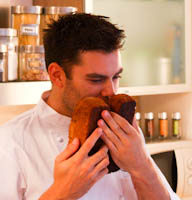 Being a chef, my sense of smell is of extreme importance, I would say, second only to the sense of taste and the ability to evaluate and balance the basic tastes – salt, sweet, sour, bitter and the new kid on the block, umami (which is hardly definable anyway).
Being a chef, my sense of smell is of extreme importance, I would say, second only to the sense of taste and the ability to evaluate and balance the basic tastes – salt, sweet, sour, bitter and the new kid on the block, umami (which is hardly definable anyway).
In the kitchen the sense of smell has many functions and can be really useful, but just like so many other things, it has to be trained right. It will tell you if the meat you´re cooking is of good quality, it will tell you when you left something in the oven, it will tell you that you forgot to throw away those uncooked pieces of fish and it will even tell you when the skillet is just about hot enough.
Everyone’s smell-analyzing profile is different due to distinct genetics, training, background and memories. Not everyone registers the same result when faced with the same scents.
This is useful for us in the restaurant kitchen, since we often consciously try to bring out “taste memories” from the guests’ past. Since flavor to a great degree equals smell, this is where much of the work has to be done. It’s not every day that it happens, but if you manage to strike the right note and bring out some of those far-away taste memories, dinner can become supernatural.
Smell works in a much more “immediate” way than for example the sense of vision. The smell is a direct broadband connection to your brain without firewalls. We are taught and used to criticize, contemplate and doubt whatever our eyes register - but the sense of smell is something that goes straight into your bone marrow and you can’t stop it.
Until not long ago, I have had the unfortunate habit of being a mouth-breather, missing out on a lot of enjoyable scents and some important information. This happened especially often when I was stressed, intensely concentrated or had been in the company of cats. These days, with greater awareness, I manage to control my breathing to my favor.
Breathing deeply through your nose is more important than you think.
2. What are some of your strongest scent memories?
Coffee roasting - I used to live in a small apartment close to a place called “Lilla Kafferosteriet”, artisan coffee roasters in Malmö, Sweden. It´s a small place in the city center where they roast and serve a variety of coffees paired with great coffee knowledge. During days that the wind was to my favor, I could have that lovely fat, aromatic, funky, spellbinding, toasted scent entering my open window.  It’s a smell so intense, so complex, I couldn’t stop sniffing it. I became addicted enough to actually do a small detour every day on my way to work, just to have a quick dose of that seducing, invigorating scent. It’s a smell I don’t come across often any more, the scent that is released in the moment of roasting the coffee beans. Freshly brewed coffee I smell a number of times every day – but the coffee roasting smell is a rare one and never fails to put me back in that open window on the second floor on a tepid spring day.
It’s a smell so intense, so complex, I couldn’t stop sniffing it. I became addicted enough to actually do a small detour every day on my way to work, just to have a quick dose of that seducing, invigorating scent. It’s a smell I don’t come across often any more, the scent that is released in the moment of roasting the coffee beans. Freshly brewed coffee I smell a number of times every day – but the coffee roasting smell is a rare one and never fails to put me back in that open window on the second floor on a tepid spring day.
3. What are some of your favorite smells (things in nature, cooking &/or your
environment)?
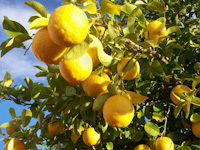 I love the smell of citrus peel, especially lemon, but I hate the fact that it’s not a lingering smell, it’s so volatile, so short-lived and as a perfume it loses its value quite quickly. Potency of a scent is not only in its opening attack, but also in its ability to linger, stay around, wrap spaces and persons in its magic.
I love the smell of citrus peel, especially lemon, but I hate the fact that it’s not a lingering smell, it’s so volatile, so short-lived and as a perfume it loses its value quite quickly. Potency of a scent is not only in its opening attack, but also in its ability to linger, stay around, wrap spaces and persons in its magic.
Sourdough bread. Whenever I go to a restaurant the first thing I do is smell the bread, it’s a decent indicator of quality, not only of the bread but also of the food in general. Restaurants that know how to bake good bread often know how to cook good food.
Dill pickles – its briny sweet and sour overture followed by the sharp aromatic properties of the dill is just an otherworldly combination that leaves little room for ambiguity - you either love it or hate it.
Red peppers roasting over an open flame. It smells divine and tastes just as good.
Tomato vines. It’s the one part of the tomato plant that actually smells like what you wish the tomato itself tasted like.
Japanese tatami mats. I usually don’t notice their smell much until I get close – lying down on a tatami covered floor with closed eyes is a dead sure way to experience pure nature indoors. It’s a warm smell of hay, herbs, horses, soil and what your sun-tanned skin smells like after a day at the beach.
4. Do you have any favorite smells that are considered strange?
Gasoline for me is a highly intriguing scent. So complex, so lingering, so heavy but yet in a refined way. I might have created the liking of gasoline-like smells quite early. As a kid, and later youngster, I divided my time between the kitchen (natural habitat of my mother) and the garage workshop (natural habitat of my father) which meant equal parts of vanilla and motor oil.
I also get some sort of positive reaction to stinky cheeses. I mean, not just the normal cheesy smell. The ones that have a smell that makes you think about sour mold, garbage truck or smelly feet, smelly to the point where amputation might be necessary, though. I guess the fact that they are cheeses makes it alright, would I find the same smell in any other place, I would run.
Natto. I had heard so much about it before I went to Japan. There are only two Natto-related groups of people. Lovers and haters. And the haters are as usual the loudest. So it sure wasn’t a positive image of Natto I had built up in my mind. It took quite some time for me to actually dare ordering it in a restaurant. When I finally did, I approached it very slowly as if it was some sort of radioactive substance.
The first sensation was a pungent odor of hot garbage and yeast. As soon as that first punch of olfactory abuse had faded, other smells came into focus. I could perceive some blue cheese, ammonia, but above all, a very consistent scent of coffee. Not a smell of old rancid coffee beans, but a smell of fresh ground lightly roasted coffee. The combined impression of the smell was – not bad at all! I know many Western cheeses that have a far worse perfume. Then on to the first chopstick-full bite of it. Taste was yeasty, definitely yeasty. Then a slight metallic sensation tickled the tongue and at last there was an acidic subset of flavors that in a way amplified the other impressions. The taste was definitely not my cup of tea. But there was one last thing. Consistency. Worst of all - unlike anything that would be considered normal in the Western world. Intact, fairly firm beans in a stringy, sticky fermented, almost bubbly goo that will cover the inside of your mouth although you try so hard to swallow it. I could smell natto any day, but eating it – no thank you.
5. Describe one or more of your favorite cooking smells.
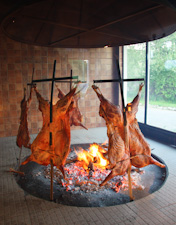 A smell that immediately makes me go crazy, and awakes the hunger in me, no matter if I just ate, is the smell of barbecue. The perfume of slowly burning wood in combination with small drops of fat and meat juices dripping down on the hot coals with a loud hissing noise, creating flames and sending small droplets of extremely perfumed steam in every direction. On a person like me, this works even better than female pheromones to get me going.
A smell that immediately makes me go crazy, and awakes the hunger in me, no matter if I just ate, is the smell of barbecue. The perfume of slowly burning wood in combination with small drops of fat and meat juices dripping down on the hot coals with a loud hissing noise, creating flames and sending small droplets of extremely perfumed steam in every direction. On a person like me, this works even better than female pheromones to get me going.
Another, certainly adorable smell is “Arrack“. It’s a liquor of Southeast Asian origin made of fermented and distilled juice from palm trees and sugar cane. It’s considered the predecessor of rum but has a sweeter complex smell with notes of caramelized vanilla, toasted almonds and smoky chocolate. It’s perfect to use in desserts and baking, makes a splendid pairing with chocolate.
6. What smells do you most dislike?
I hate the smell of a newly opened, newly printed book. If the smell is strong enough it makes me want to throw up. It’s a stench of vomit mixed with a smell of the “forklift section” of an IKEA warehouse and a bit of cheap glue. The first moments of opening a new cookbook can be quite a suffering because of its opposing nature – beautiful pictures and horrible smell.
 I’m not fond of the smell that develops when welding metals together, a really harsh smell of burning metal, fireworks, with a chemical tone to it.
I’m not fond of the smell that develops when welding metals together, a really harsh smell of burning metal, fireworks, with a chemical tone to it.
The smell of old fish. Can’t stand it – but it’s a very good signal that someone needs to go through the contents of the fridge.
The stinky, murky water that remains in the vase a couple of days after the flowers have died.
7. What smell did you first dislike, but learned to love?
I have a couple of newcomers in my fragrance repertoire:
Sesame oil. I truly hated it because of its nauseating, repulsive, offensive, choking smell.
Nowadays I love it which is quite unexplainable since I still consider it a gross smell, too sticky and brutal, but with a bunch of addictive properties. I even use it often in my cooking.
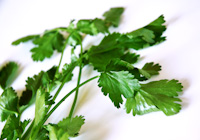 Cilantro – here I had the same problem. I found it really disgusting as a smell, too green, too crude, too earthy. It has a perfume strikingly similar to a wild plant called Petasites hybridus, quite common where I grew up and which I hated. Their umbrella-sized leaves were fun to play around with, but I just couldn’t stand the smell of them. For me it all changed after a two-month stay in Mexico – the country of cilantro. There was just no escaping it. And slowly but surely it created some sort of curious addiction which will most certainly last a lifetime.
Cilantro – here I had the same problem. I found it really disgusting as a smell, too green, too crude, too earthy. It has a perfume strikingly similar to a wild plant called Petasites hybridus, quite common where I grew up and which I hated. Their umbrella-sized leaves were fun to play around with, but I just couldn’t stand the smell of them. For me it all changed after a two-month stay in Mexico – the country of cilantro. There was just no escaping it. And slowly but surely it created some sort of curious addiction which will most certainly last a lifetime.
Other entries of the same category are Tar, a complex smell of scorched soil, liquorice and burnt leather that takes some time getting used to, and good Whisky, a blend of so many different fragrances that your head goes into a spin.
8. What mundane smells inspire you?
Coffee, again. A freshly made cup of coffee is a kickstart for all senses and its scent is one of the best ways to get out of bed in the morning.
Garlic. Fresh or lightly cooked garlic is a great way to get the imagination (and hunger) going in the kitchen.
Burning candles. I’m not a big fan of those immensely popular perfumed candles, but rather a neutral wax candle and the aroma its wick releases.
9. What scent never fails to take you back in time and why?
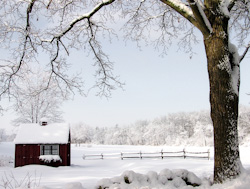 This childhood memory is rather a non-memory: In my native Sweden, stepping outdoors early on a cold winter’s morning, the ground uniformly padded with a thick layer of soft, cotton-white glistering snow that squeaks with each step upon it and mutes most of the surrounding sounds – the world is never as quiet as in a place full of snow. The overcast skylight reflected in every direction making you feel like being in a well-lit photo studio, temperature well below zero degrees, the air crisp like cornflakes. Inhaling, filling the lungs with cold air, chilling the whole inside of the body. After a couple of deep breaths, what do I smell? Nothing. Absolutely nothing. Not one single thing. It always amazed me how the freezing cold like that created a complete absence of smells. It was like being in a giant scent vacuum.
This childhood memory is rather a non-memory: In my native Sweden, stepping outdoors early on a cold winter’s morning, the ground uniformly padded with a thick layer of soft, cotton-white glistering snow that squeaks with each step upon it and mutes most of the surrounding sounds – the world is never as quiet as in a place full of snow. The overcast skylight reflected in every direction making you feel like being in a well-lit photo studio, temperature well below zero degrees, the air crisp like cornflakes. Inhaling, filling the lungs with cold air, chilling the whole inside of the body. After a couple of deep breaths, what do I smell? Nothing. Absolutely nothing. Not one single thing. It always amazed me how the freezing cold like that created a complete absence of smells. It was like being in a giant scent vacuum.
Another flashback from when I was a kid, was a special kind of glue that we used in kindergarten. This glue was made especially for kids and contained no toxic substances, no acids and was harmless to both kids and nature. It had a very strong scent of almond, deep, slightly sweet, a bit greasy - pure almond. Somewhere in the neighborhood of Amaretto I would say. It had no smell of volatile aggressiveness like so many other types of glue. The smell was so bewitching that many of the kids actually tasted some. But “they said” it didn’t taste as good as it smelled…
10. What scents do you associate with memories of loved ones?
The smell of old peoples’ houses always takes me back to when I was a child and visited my grandparents. I have no idea what this smell is made up of, but if they ever made a perfume or air freshener out of it, it would be called “Old peoples’ house”. It’s typically not a delightful smell, but neither an unpleasant one. It’s just based on home. Closed doors. Dust. A certain type of diet maybe. A bit of medication. It’s quite complex and smells a bit like fog looks. You never know where it starts and where it ends, all of a sudden you’re just surrounded by it.
I don’t know if their houses actually smelled like that already when I was young, or if it’s just my brain playing a trick on me. Whatever might be the case, this smell is firmly connected to happy memories of being served pancakes at my grandmother’s house after school, or a weekend sleepover at my grandfather’s house.
11. What fragrance(s) remind you of growing up?
Most of these are early memories from the kitchen – my mother, Guru of sweet stuff, baking or making candy for Christmas - the amazingly rich aroma from toffee cooking on the stove, a sticky, warm, caramelized vanilla-like aroma. It can also be browned butter, cinnamon rolls just out of the oven or my grandmother’s onion-loaded meatballs.
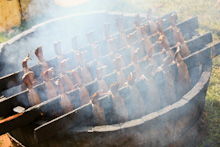 Smoked meat and fish always reminds me of home. Smoking in combination with salting is a very common way of treating meat and fish in Sweden. Every time my father returned home with a cold smoked sausage or salted pork meat it was a feast.
Smoked meat and fish always reminds me of home. Smoking in combination with salting is a very common way of treating meat and fish in Sweden. Every time my father returned home with a cold smoked sausage or salted pork meat it was a feast.
Another, less pleasant one, is the smell of school locker room, after an hour of physical exercise. Body odors in combination with warm, stagnant water from the showers creating high humidity, a hint of sweaty shoes, shampoo and Axe® deodorant.
12. What fragrance(s) remind you of the places you visited on vacation?
 Standing on the edge of a bay in southern New Zealand on an autumn morning, an overwhelming strong smell of iodized wind, fresh sea and fish, algae and cucumber, ocean spray on my face, grey clouds laden with rain, minerals, rugged coastal scenery – heavy on all senses, but still such a perfect snapshot of what nature is like, not the picture-perfect postcard representation. To me that morning smelled like what it tastes like to eat a good oyster – or even what it must feel like to be an oyster. Whenever I eat an oyster now I always send a thought to that remote, wind-beaten bay.
Standing on the edge of a bay in southern New Zealand on an autumn morning, an overwhelming strong smell of iodized wind, fresh sea and fish, algae and cucumber, ocean spray on my face, grey clouds laden with rain, minerals, rugged coastal scenery – heavy on all senses, but still such a perfect snapshot of what nature is like, not the picture-perfect postcard representation. To me that morning smelled like what it tastes like to eat a good oyster – or even what it must feel like to be an oyster. Whenever I eat an oyster now I always send a thought to that remote, wind-beaten bay.
In some way it seems to me that every time I am close to the sea, in that salt-loaded air, my sense of smell is heightened, like every bit of city-caused nose congestion vanishes in an instant.
Something that never seizes to amaze me when I travel is how different countries can have such distinct smells. I still remember the first time, after having reached conscious age, that I visited a Mediterranean country. This country just happened to be Italy, sheer coincidence. I was coming from Sweden, a quite chilly place with its very delicate perfumes reminiscent of pine, floral grass, fresh wood, sea. Arriving in hot Italy I had a slight sensorial shock where my senses were turned upside down – I registered so many new scents, like a complex theater scene made up of fragrances. Terra cotta, dirt, citrus, garlic, burning wood, decay, aromatic herbs, grilled fish and a kind of deep smell of antiquarian shop. Wow! This was a place that actually had a perfume!
This has happened many times since then, although now Italy sets the standard and is the new base for comparison. For example last summer I went to Japan which has a completely different set of ambient smells. There you would find scents of fish, but fresh fish, never that old stinky fish. Seaweed, burning charcoal, green leaves, incense and a little bit of something resembling chicken soup.
13. Describe a piece of sensory literature that is very magical for you.
Honestly, I’m not a big reader, unless we are talking about food literature, and even then I prefer books that communicate with captivating pictures and not only words. My latest project has been to start a journey towards an extended 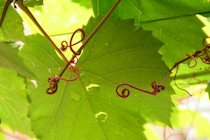 knowledge about wines (starting from scratch). I attended a wine tasting and I bought a book. When I opened up that book and started reading, it was like I discovered a completely new language. This must be what it felt like for the first world explorers, arriving to a new continent, discovering a new culture, and with it, a new language.
knowledge about wines (starting from scratch). I attended a wine tasting and I bought a book. When I opened up that book and started reading, it was like I discovered a completely new language. This must be what it felt like for the first world explorers, arriving to a new continent, discovering a new culture, and with it, a new language.
I came across a wholly new way of describing the things we smell, feel, taste and experience in relation to wine. New words with an outstanding ability to make my mouth water just by reading them.
It’s interesting to read about how to put a name on what you feel and smell, since scents basically are feelings. In the same way I found it fascinating how people manage to divide scents in categories, since I’ve always felt that scents tend to resist classification. What they are to one person, they might not be to another.
What does the sense of smell mean to you? What are some of your favorite and non-favorite smells? Leave a comment!
————————————————————————————————————————————-
This sensory questionnaire was originally created by Glass Petal Smoke
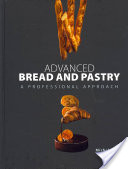

7 Responses to “Can you smell that? Olfaction satisfaction”
June 15th, 2011 at 21:40
Great post John though i find it a bit dishonest that you have revealed your most personal olfactory memories but won’t fess up to eating glue. Weak!
There is so much food for thought here I don’t know where to start. Your point about restaurant bread is an important one. It is that kind of attention to quality and detail that indicate a capable kitchen
As for smells from my memories, i dont think ive ever come across any place that smells like my grandmother’s kitchen, where the faint smell of butter lingered always and there was always something in the oven and on the stove.
My favorite smells are Barolo and bacon. My least? Axe cologne.
June 16th, 2011 at 00:45
Thanks for your comment! But can we please leave the glue-eating part out of this? I was a kid!
Imagine a pig fed with leftover Nebbiolo grapes! Then slowly roasted over hot charcoal!
June 25th, 2011 at 19:15
Thanks for taking the Glass Petal Smoke sensory questionnaire. P.S. Nice posts on Noma.
June 26th, 2011 at 05:02
Thanks Michelle!
June 26th, 2011 at 05:05
Restaurant bread is an important one - you said it! That’s why I’ve spent the last month developing new bread recipes for the restaurant where I’m currently working. I’m not a baker, but still we have to try our best, right?
June 26th, 2011 at 12:04
What about the fact that we have a family thing going on when it comes to smelling, chewing and sneezing chocolate, the darker and stronger chocolate, the heavier sneeze…
June 29th, 2011 at 14:48
Il y avait bien des années que, de Combray, tout ce qui n’était pas le théâtre et le drame de mon coucher, n’existait plus pour moi, quand un jour d’hiver, comme je rentrais à la maison, ma mère, voyant que j’avais froid, me proposa de me faire prendre, contre mon habitude, un peu de thé. Je refusai d’abord et, je ne sais pourquoi, me ravisai. Elle envoya chercher un de ces gâteaux courts et dodus appelés Petites Madeleines qui semblent avoir été moulés dans la valve rainurée d’une coquille de Saint-Jacques. Et bientôt, machinalement, accablé par la morne journée et la perspective d’un triste lendemain, je portai à mes lèvres une cuillerée du thé où j’avais laissé s’amollir un morceau de madeleine. Mais à l’instant même où la gorgée mêlée des miettes du gâteau toucha mon palais, je tressaillis, attentif à ce qui se passait d’extraordinaire en moi. Un plaisir délicieux m’avait envahi, isolé, sans la notion de sa cause.
Et tout d’un coup le souvenir m’est apparu. Ce goût, c’était celui du petit morceau de madeleine que le dimanche matin à Combray (parce que ce jour-là je ne sortais pas avant l’heure de la messe), quand j’allais lui dire bonjour dans sa chambre, ma tante Léonie m’offrait après l’avoir trempé dans son infusion de thé ou de tilleul. La vue de la petite madeleine ne m’avait rien rappelé avant que je n’y eusse goûté; peut-être parce que, en ayant souvent aperçu depuis, sans en manger, sur les tablettes des pâtissiers, leur image avait quitté ces jours de Combray pour se lier à d’autres plus récents; peut-être parce que, de ces souvenirs abandonnés depuis si longtemps hors de la mémoire, rien ne survivait, tout s’était désagrégé; les formes - et celle aussi du petit coquillage de pâtisserie, si grassement sensuel sous son plissage sévère et dévot - s’étaient abolies, ou, ensommeillées, avaient perdu la force d’expansion qui leur eût permis de rejoindre la conscience. Mais, quand d’un passé ancien rien ne subsiste, après la mort des autres, après la destruction des choses, seules, plus frêles mais plus vivaces, plus immatérielles, plus persistantes, plus fidèles, l’odeur et la saveur restent encore longtemps, comme des âmes, à se rappeler, à attendre, à espérer, sur la ruine de tout le reste, à porter sans fléchir, sur leur gouttelette presque impalpable, l’édifice immense du souvenir.
Proust.